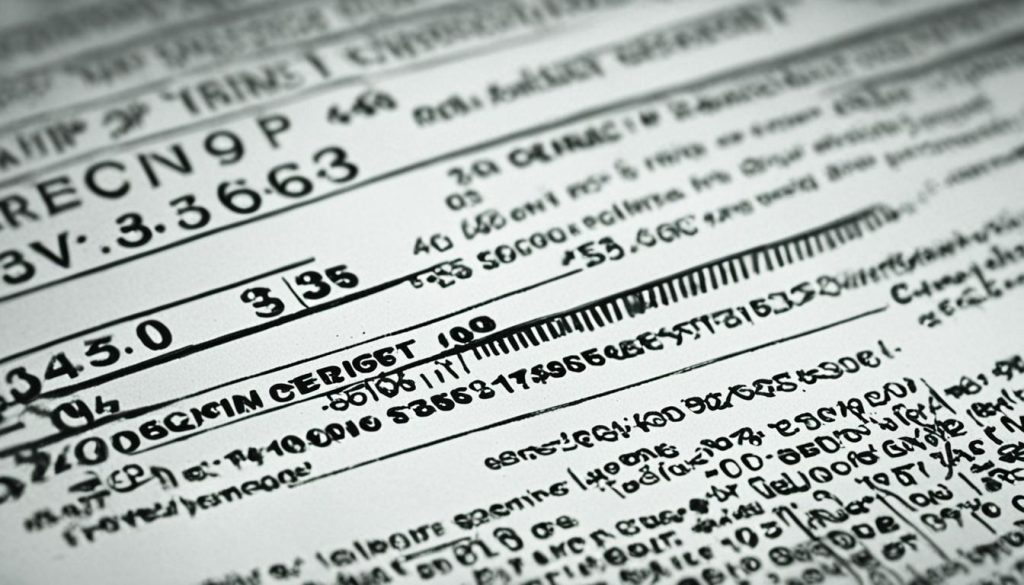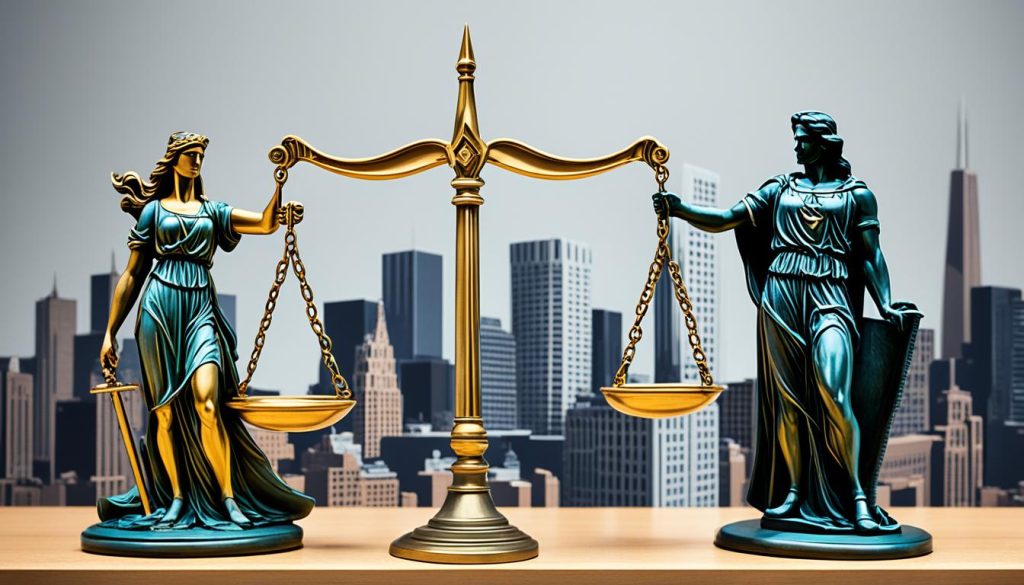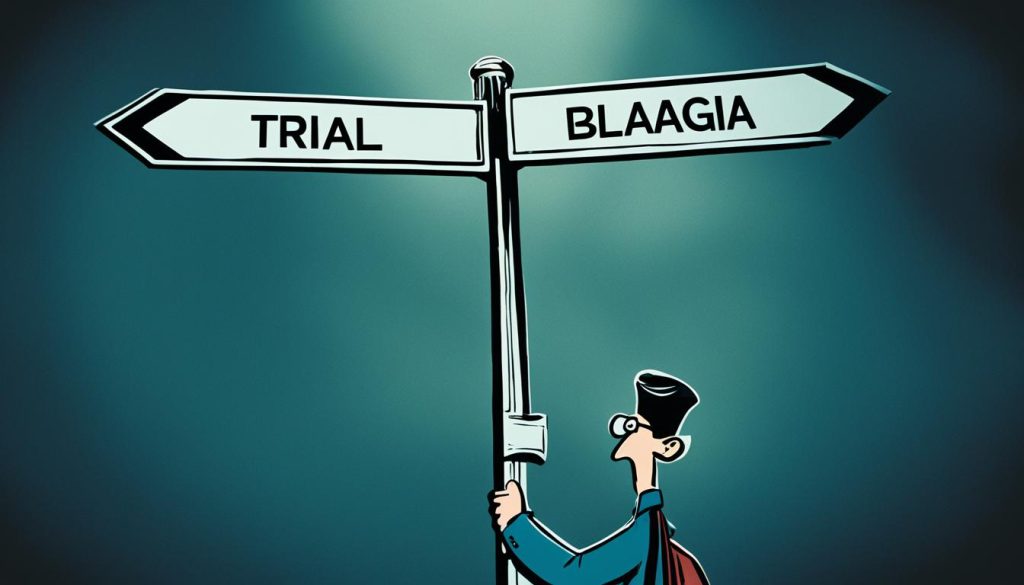In the complex world of criminal proceedings, plea bargains are key in the American justice system. A plea bargain is when the prosecution and the defendant agree on a deal. The defendant agrees to plead guilty to some charges1. In return, they get offered less severe charges, like fewer counts, shorter prison time, or a lighter charge1. This deal helps the defendant avoid a long trial and a harsher sentence. It also saves the prosecution time and money1.
Plea bargains are a common way to settle criminal cases in the U.S., with about 95% of cases ending in a plea bargain2.
Key Takeaways
- Plea bargains are a common legal negotiation tool in the American criminal justice system, with the vast majority of cases (95%) being resolved through this process2.
- Plea bargains offer defendants the opportunity to plead guilty in exchange for reduced charges or shorter sentences, providing a more efficient resolution compared to a full trial1.
- Prosecutors rely heavily on plea bargains due to limited resources, and the first defendant to reach a plea deal may receive the best offer1.
- Charge bargaining, where the defendant pleads guilty to lesser charges, is the most common type of plea bargain3.
- Plea bargaining is a complex process that involves careful negotiations between defense attorneys and prosecutors to protect the defendant’s interests1.
What are Plea Bargains?
A plea bargain is when a defendant and the prosecutor make an agreement. The defendant agrees to plead guilty or no contest to a lesser charge. In return, they get leniency from the prosecution4. This can mean getting a lighter sentence or having other charges dropped4.
Definition and Overview
About 90-95% of criminal cases in the U.S. end with a plea bargain4. These deals help prosecutors focus on harder cases, keeping courts from getting too backed up4. If a plea bargain is broken, it’s like breaking a contract. The prosecutor can stop following the deal4.
Types of Plea Bargains
There are three main kinds of plea bargains:
- Charge bargaining – The defendant agrees to a less serious charge.
- Sentence bargaining – The defendant is guilty but gets a lighter sentence.
- Fact bargaining – The defendant agrees on certain facts to avoid other facts being used in sentencing.
These bargains can affect future crimes. They might prevent a “strike” under three strikes laws or lessen future sentences5.
The Negotiation Process
The plea bargain negotiation is a complex process between the defense attorney and the prosecutor. They aim to find a deal that works for both sides6. Defense lawyers use their legal skills to get the best deal for their clients6. They might discuss charge, sentence, and fact bargaining to find a solution7.
Role of Attorneys
During negotiations, the defense and prosecutor have a strategic conversation. They look at the evidence, trial risks, and what’s best for the client8. The defense lawyer’s main goal is to help their client. They present evidence to get a lighter charge or sentence8. It’s important for the lawyer to explain the deal’s legal effects to the client8.
Presenting the Agreement to the Judge
After agreeing, the deal must go before a judge for approval7. In Florida, the judge can accept or reject the deal under Rule 3.171 of the Florida Rules of Criminal Procedure7. The judge will okay the deal if it seems fair. But they might reject it if it’s not seen as just7.
Documentation and Formalities
If the judge says yes, the deal is documented and signed by everyone7. This process aims to close the case for everyone involved7. But, it also raises worries about pressure and fair legal help, showing the need for careful review of each case7.
| Factors Considered in Plea Bargain Negotiations | Potential Outcomes of Plea Bargaining |
|---|---|
|
|
“Plea bargaining serves as a strategic tool for case management in the criminal justice system, helping manage large caseloads effectively.”7
The defense attorney’s role is key in plea bargain negotiations, aiming for the best outcome for their client6. Plea deals can save time and work well, but there are concerns about pressure and the need for fair representation7.
plea bargains, criminal cases, legal negotiation
The U.S. criminal justice system has seen a big change, with plea bargains now being a key part. Most criminal cases, about 90-95% in states and 97% in federal cases, end with a plea bargain9104. These deals between prosecutors and defendants help wrap up cases fast and save court resources. But, they also bring up worries about being forced into deals, unfair treatment based on race and money, and less protection for defendants’ rights.
Plea bargaining is a big part of criminal cases9. Prosecutors have rules to follow when making deals, making sure charges match the crime, fit the punishment, and have enough evidence9. These deals can lead to set sentencing, admitting to crimes, easing the burden on victims and witnesses, shorter sentences for guilty pleas, and encouraging early pleas9. They also help speed up case endings, save time and money, and reduce the number of trials9.
| Plea Bargain Advantages | Plea Bargain Disadvantages |
|---|---|
| Efficient case resolution | Concerns about coercion |
| Resource allocation for the courts | Racial and socioeconomic disparities |
| Guaranteed sentencing for the accused | Erosion of defendants’ constitutional rights |
| Reduction in sentence for pleading guilty | – |
| Incentivizing others to plead early | – |
Plea bargaining is a common way to settle criminal cases in the U.S., with most cases ending this way10. Those who plead guilty often get lighter sentences than those who go to trial10. Studies show that from 77% to 83% of defendants pleaded guilty in the early 1900s, with some places seeing up to 96% of felony cases end in guilty pleas10. The Supreme Court has said it’s okay to offer lighter sentences for guilty pleas and that defendants can plead without admitting they did it10.
Even though plea bargains are common, they bring up big concerns. Prosecutors have a lot of power in these deals, which can lead to unfair treatment based on race and money4. There are other ways to handle cases, like diversion programs, which offer a chance for probation and possibly clearing the record if completed4.
“Plea bargaining is a necessary evil in our criminal justice system, but it must be carefully monitored to ensure fairness and protect the rights of defendants.”
Advantages of Plea Bargains
Plea bargains bring many benefits to the criminal justice system11. They make trials shorter, which helps judges, lawyers, and court staff11. This is crucial because courts are always busy with criminal cases11.
These bargains also save money and resources needed for trials11. Trials can take a long time, but plea bargains can settle cases quickly12.
Efficient Case Resolution
Plea bargains offer a fast and sure way to end cases12. They can save defendants money on lawyer fees because trials cost more12. Plus, getting a plea deal can mean fewer serious charges on your record12.
This can help with jobs, licenses, and even voting rights12.
Resource Allocation
Plea bargains help clear up courtrooms and use resources better in the criminal justice system11. Prosecutors like them because they’re busy and need to work efficiently12. They also help with jail space and make processing cases faster13.

But, it’s important to watch out for the downsides and keep things fair for everyone13.
Controversies Surrounding Plea Bargains
Plea bargains are often seen as efficient and a way to save resources. Yet, they face a lot of criticism. Critics say they let defendants avoid the full consequences of their actions, which can weaken the impact of punishment14. There’s also worry that the negotiation process can force innocent people to plead guilty just to get a lighter sentence14.
Another big issue is that plea bargains might go against defendants’ rights. Some argue they make defendants give up their right to a jury trial and other important rights14. This imbalance between prosecutors and defendants makes people think plea bargains are unfair and too pushy14.
Studies show that those with a history of crime might get better deals through plea bargains. This raises questions about fairness in justice14. Scholars believe some punishments are too strict. They think plea bargaining can lead to punishments that fit the crime better, which could be seen as a plus14.
The debates over plea bargains show the tricky balance in the criminal justice system. They weigh efficiency, fairness, and protecting rights1415.
| Plea Bargain Controversies | Key Concerns |
|---|---|
| Undermining Deterrence | Plea bargains may reduce the deterrent effect of punishment, as defendants can avoid or lessen the consequences of their actions14. |
| Coerced Guilty Pleas | The negotiation process can lead to defendants, including innocent individuals, feeling compelled to accept plea deals to avoid harsher sentences14. |
| Constitutional Rights Concerns | Plea bargains may require defendants to waive their right to a jury trial, self-incrimination, and confronting witnesses, raising issues of fairness14. |
| Sentencing Disparities | Defendants with prior criminal records may negotiate more favorable sentences, leading to concerns about the equitable application of justice14. |
“Plea bargaining is a necessary evil in the criminal justice system, but it must be carefully regulated to ensure fairness and protect the rights of the accused.”
The debates over plea bargains show the complex balance between efficiency, fairness, and protecting rights in the criminal justice system.1415
Racial and Socioeconomic Disparities
Studies show big differences in plea bargain outcomes, with race and money matters a lot16. White defendants get better deals than Black ones, being 25% more likely to see serious charges reduced or dropped16. This bias isn’t just in charge reductions. White defendants are also 15% more likely to get convicted of a lesser crime than a felony16.
Money matters a lot in plea bargains too. Those with private lawyers do better than those with overworked public defenders17. Black adults are 5-7 times more likely to be locked up than white adults17. This is partly because of plea bargaining17. Prosecutors and lawyers might have biases that lead to tougher deals for minorities18. This helps explain why more Black people are in prison17.
Racial Bias in Plea Bargaining
Research shows white defendants get better plea deals than Black ones, even with the same criminal history16. This is true for misdemeanors too. White people are 75% more likely to see all imprisonment charges dropped or reduced than Black people16.
Socioeconomic Factors
Having a good lawyer is key to a good plea bargain, and private lawyers usually do better than public ones17. Public defenders, who handle many cases, often agree to longer sentences than private lawyers17. This adds to the racial and class biases in the U.S. justice system17.

“The plea bargaining process can lead to significant racial disparities in prisons, reinforcing harmful stereotypes about Black criminality.”17
To fix these issues, we need a big plan. This includes being open, training lawyers about bias, and looking at plea bargaining again. Only then can we make sure justice is fair for everyone.
Alternatives to Plea Bargains
Plea bargains are the main way to settle criminal cases in the U.S., but new options are coming up19. One option is diversion programs. These let defendants with minor charges skip a full trial and possible conviction.
Diversion Programs
With diversion programs, defendants can do probation or rehab instead of going through the usual criminal process20. If they finish the program, their charges might be wiped from their record20. This helps avoid the bad effects of a conviction.
These programs can be many things, like drug treatment courts or community justice projects20. They focus on fixing the issues that led to the crime, not just punishing the person20. They offer help with rehab, counseling, and support to stop crime from happening again.
Using diversion programs is a big step towards fixing the criminal justice system19. They offer a kinder, more complete way to deal with crimes20. They could cut down on plea bargains, make things fairer, and help people change for the better20.
| Plea Bargains | Diversion Programs |
|---|---|
| Guilty plea in exchange for reduced charges or lighter sentence | Opportunity to complete probation or rehabilitation instead of trial |
| Efficient case resolution but potential for coercion and disparities | Holistic approach to address underlying issues and promote rehabilitation |
| Over 90% of criminal cases resolved through plea bargains | Charges may be expunged upon successful program completion |
“Diversion programs offer a more compassionate and effective approach to addressing criminal behavior, providing defendants with the support and resources they need to address the root causes and successfully reintegrate into their communities.”
As we work on fixing the criminal justice system, looking at alternatives like diversion programs is key19. These new ways could change how we handle criminal cases, giving people a fresh start and focusing on fixing problems2019.
Conclusion
Plea bargains are a big part of the U.S. criminal justice system. They make things more efficient and save resources. But, they also bring up worries about forcing people to plead guilty, unfair treatment based on race and money, and less protection for defendants’ rights21.
More than 90% of criminal cases in the U.S., including in Texas, end with plea deals21. In Texas, over 90% of cases settle through plea agreements21. Only about 5 to 7% of cases go to trial in Texas21.
Even though plea bargains are common, there’s a lot of debate about them. People want to fix the system with things like diversion programs22. These programs aim to solve the big issues and offer fairer solutions22.
Plea bargaining affects a lot of criminal cases in the U.S22. Having a good lawyer can really change how plea talks go for common crimes22. It also helps keep the courts from getting too backed up with cases22.
The argument over plea bargains is ongoing. They play a big and complex role in American law23. Plea deals in the Federal system are written down and follow strict rules23. Judges make sure the defendant fully understands before setting a plea hearing date23.
FAQ
What is a plea bargain?
A plea bargain is when the prosecution and the defendant make an agreement. The defendant agrees to plead guilty to the charges. This usually means they get lesser criminal charges or a lighter sentence.
What are the main types of plea bargains?
There are three main types of plea bargains. Charge bargaining means the defendant pleads guilty to a less serious charge. Sentence bargaining means the defendant accepts guilt but gets a lighter sentence. Fact bargaining means the defendant agrees to certain facts in exchange for the prosecution not presenting other facts during sentencing.
How does the plea bargain negotiation process work?
Legal professionals from both sides discuss plea bargains. They make offers and counter-offers, considering strategies to agree on a deal. Once they reach an agreement, it goes to a judge for approval.
What are the advantages of plea bargains?
Plea bargains help the criminal justice system by making cases resolve faster. They save money and reduce the workload for judges and lawyers. This makes the system more efficient.
What are the controversies surrounding plea bargains?
Plea bargains face criticism for being coercive and unfair. There are worries about racial and economic biases. Some say they limit defendants’ rights, like the right to a jury trial or to remain silent.
How do racial and socioeconomic factors influence plea bargain outcomes?
Research shows that race can affect plea bargains. White defendants might get better deals than Black ones. Being wealthy can also help, as those with private lawyers often get better results than those with public defenders.
What are some alternatives to plea bargains?
To address plea bargain issues, some places offer alternatives. These include diversion programs. They let defendants avoid a trial by completing a program or probation instead.

